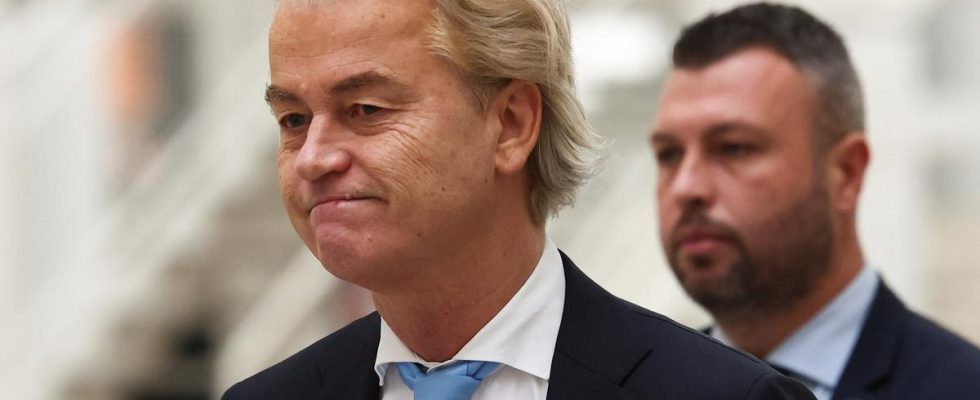Geert Wilders, figure of the extreme right in the Netherlands. YVES HERMAN / REUTERS
After predicting for weeks a neck-and-neck race between three candidates, opinion polls announced, a few days before the election, an unexpected breakthrough by the far right.
Geert Wilders’ far-right Dutch party won the legislative elections on Wednesday (November 22), exit polls suggest, in a political earthquake that will be felt well beyond the borders of the Netherlands. The PVV (Freedom Party) won 35 seats and a comfortable electoral victory, according to Ipos polls. Frans Timmermans’ left-wing alliance is second with 26 seats. The center-right VVD won 23 seats, according to the poll.
If it is confirmed by the final results, Geert Wilders’ victory marks a sudden turn to the right which will be greeted with apprehension in Brussels: the PVV has notably promised a referendum on the accession of the Netherlands to the European Union. “This may not be what other parties in Europe or other countries are looking for, but hey, that’s democracy.» declared the 60-year-old politician after voting.
His anti-immigration message, including closing borders and deporting illegal immigrants, appears to have resonated with Dutch voters. But if Mr. Wilders seems to have triumphed in the polls, it is not certain that he will succeed in forming a government coalition. The leaders of the three other main parties have assured that they will not participate in a coalition led by the PVV. Kate Parker, of the Economist Intelligence Unit, said this would lead to a “constitutional impasse» in the fifth largest economy in the EU.
Read alsoNetherlands: Timmermans, the “green pope” who rubs shoulders with realpolitik
“Attack”
Geert Wilders has been in the Dutch political landscape for decades. He built his career on a crusade against what he calls a “Islamic invasion» of the West. Neither the troubles with the Dutch justice system, which found him guilty of insulting Moroccans, nor the death threats against him, which have kept him under police protection since 2004, have discouraged him. “I don’t regret fighting for freedom“, Geerts Wilders told AFP in an interview on the eve of the 2021 elections. “Of course I take a stand, I’m attacked, my country is attacked“.
Geerts Wilders, who tried to smooth out some of his populist rhetoric and focus on other concerns of voters, ended up exceeding expectations. There is “bigger problems than tackling the flood of asylum seekers and immigrants“, he said during one of the last election debates, adding that he was ready to put aside his views on Islam to govern. If immigration remained a key subject of the campaign, the Dutch are even more worried about “find out if they still have more money left in their wallet“, he insisted. He promised to focus more on “safety and health care» than on his opposition to Islam. He assured journalists in The Hague after voting that he would be prime minister for “everyone in the Netherlands, regardless of religion, origin, gender or anything else“.
“Nexit”
But the PVV manifesto retained its trademark tone. “Asylum seekers feast on delicious free buffets on cruise ships while Dutch families must cut back on purchases“, we can read in the manifesto. Proposed anti-immigration measures include reinstating Dutch border control, detaining and deporting illegal immigrants, sending back Syrian asylum seekers and re-introducing work permits for intra-EU workers. As for Islam, the PVV manifesto says: “the Netherlands is not an Islamic country. No schools, Korans and Islamic mosques“. He proposes banning the wearing of headscarves in government buildings.
In matters of foreign policy, he defends an approach “the Netherlands first» which includes the closure of its representation in Ramallah and the strengthening of ties with Israel, in particular the moving of its embassy to Jerusalem. A “binding referendum” on a “Nexit» – the exit of the Netherlands from the EU – also appears in the program, as well as a “immediate stop» development aid. Geerts Wilders was participating in his sixth election, after having failed to cause an upset on several occasions. “When I left my old party (the VVD) (…) I said that one day we will become the largest party“, Geerts Wilders told journalists while voting.
” data-script=”https://static.lefigaro.fr/widget-video/short-ttl/video/index.js” >

